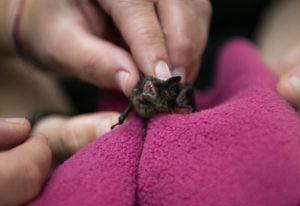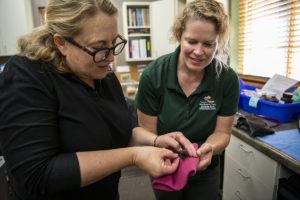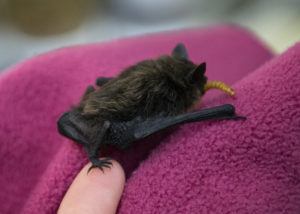
It couldn’t fly, but it had all the tiny, angular cuteness you could possibly want. In a small meshed container in the Northwest Trek veterinary clinic, a little brown bat hung in folds of soft pink cloth, sleepily chomping a mealworm and getting ready to be an ambassador – a new lease on life, thanks to Northwest Trek staff.
“One of our keepers found him on the floor of the exit breezeway,” explained keeper Wendi Mello, gently lifting the sleepy bat out of its temporary house. “It was injured and couldn’t fly, but we knew we could help.”

Keepers brought the tiny creature to the veterinary clinic, where veterinarian Dr. Allison Case gave him an overall exam. As she gently extended his wings, the little animal twittered energetically, showing a mouthful of teeth. With tiny claws, thin bones and wings, it looked remarkably like a baby dragon.
“Sorry,” she murmured.
All clear for health but too injured to fly again, the bat will be sent to a local wildlife rehabilitation center to become an animal ambassador. (Northwest Trek does not rehabilitate injured wild animals.) He’ll also have bat companions – essential for this highly social species to thrive.

Northwest Trek has a huge bat population. With over 650 bats noted at the last summer bat count evening, it’s one of the largest colonies in the Puget Sound region. As well as counting them, the park collaborates with the Washington Department of Fish and Wildlife to study them in order to better understand white-nose syndrome, a fungal disease that has devastated bats around the country but, thankfully, isn’t present at Northwest Trek.
While this bat can’t rejoin his colony, he’ll be helping them in other ways.
“Ambassador animals are wonderful,” said Mello. “Especially these little guys. People can see how awesome they are in a way they never could in the wild. It’s all about helping people understand and care about wildlife.”
IF YOU SEE A SICK/INJURED BAT:
-
Don’t touch it. (Bats can carry rabies, and Northwest Trek staff who handle them have been vaccinated against this disease.)
-
And don’t bring it to Northwest Trek – we don’t rehabilitate injured wild animals.
-
Instead, report it to the WDFW at 360-902-2515 or wdfw.wa.gov/bats.
LEARN MORE: On our Bat page.